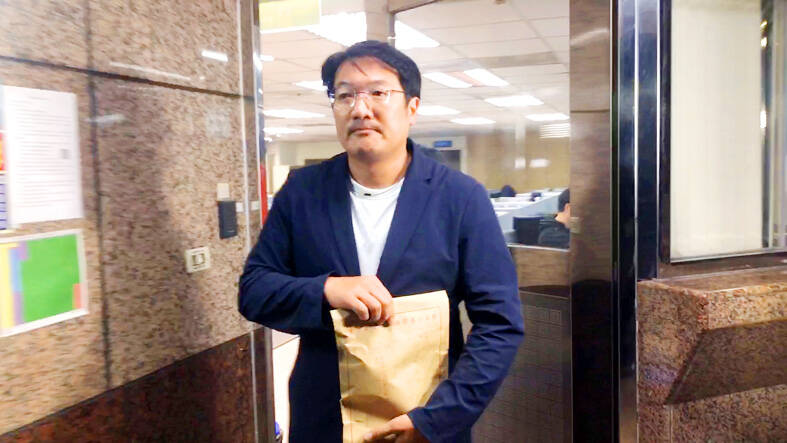Keelung Department of Civil Affairs Director Chang Yuan-hsiang (張淵翔) yesterday resigned from his post after being released on bail late on Tuesday for allegedly using public household registration rolls to aid a recall effort against Democratic Progressive Party (DPP) city councilors.
Keelung City Government spokesman Lu Ching-wei (呂謦煒) yesterday said that Chang had submitted his resignation and it had been approved by Keelung Mayor George Hsieh (謝國樑).
The department’s deputy director, Chao Ming-hua (趙明華), would serve as acting director, Lu added.

Photo: CNA
Late on Tuesday night, the Keelung District Court released Chang on NT$400,000 bail.
Chang is suspected of accessing the household registration system to verify or obtain personal data to assist with the recall petition targeting DPP city councilors Cheng Wen-ting (鄭文婷) and Jiho Chang (張之豪), the court said.
After being questioned, Chang “admitted” to personal data protection offenses and document forgery, the court said, adding that it denied a request by prosecutors to detain him after taking into account Chang’s confession.
The court said that it was unnecessary to detain Chang, as he had admitted guilt during questioning, despite there being concerns of collusion and tampering with witnesses.
However, he is restricted to his residence and is barred from having contact with other suspects or witnesses in the case, it added.
Two other suspects — recall campaign leader Chi Wen-chuan (紀文荃) and Chinese Nationalist Party (KMT) Renai District (仁愛) committee director Chang Chin-fa (張金發) — were detained incommunicado.
The court ordered that Chi and Chang Chin-fa be detained, as they are accused of the “serious crimes” of illegally using personal data in contravention of the Personal Data Protection Act (個人資料保護法) and forging private documents.
Prosecutors also found chat group messages in which Chi removed the original members and advised people to leave the group after a member shared a news article about the KMT headquarters in Tainan being searched in relation to another recall petition forgery investigation, the court said.
The court rulings came after the prosecutors in charge of an investigation into the use of alleged fraudulent signatures in the recall petitions against DPP city councilors raided six locations in Keelung on Monday.
The raids mirrored other actions by prosecutors across Taiwan over the past few weeks, mostly targeting KMT offices to crack down on alleged signature fraud in campaigns to recall DPP lawmakers or local government officials.

Right-wing political scientist Laura Fernandez on Sunday won Costa Rica’s presidential election by a landslide, after promising to crack down on rising violence linked to the cocaine trade. Fernandez’s nearest rival, economist Alvaro Ramos, conceded defeat as results showed the ruling party far exceeding the threshold of 40 percent needed to avoid a runoff. With 94 percent of polling stations counted, the political heir of outgoing Costa Rican President Rodrigo Chaves had captured 48.3 percent of the vote compared with Ramos’ 33.4 percent, the Supreme Electoral Tribunal said. As soon as the first results were announced, members of Fernandez’s Sovereign People’s Party

MORE RESPONSIBILITY: Draftees would be expected to fight alongside professional soldiers, likely requiring the transformation of some training brigades into combat units The armed forces are to start incorporating new conscripts into combined arms brigades this year to enhance combat readiness, the Executive Yuan’s latest policy report said. The new policy would affect Taiwanese men entering the military for their compulsory service, which was extended to one year under reforms by then-president Tsai Ing-wen (蔡英文) in 2022. The conscripts would be trained to operate machine guns, uncrewed aerial vehicles, anti-tank guided missile launchers and Stinger air defense systems, the report said, adding that the basic training would be lengthened to eight weeks. After basic training, conscripts would be sorted into infantry battalions that would take

GROWING AMBITIONS: The scale and tempo of the operations show that the Strait has become the core theater for China to expand its security interests, the report said Chinese military aircraft incursions around Taiwan have surged nearly 15-fold over the past five years, according to a report released yesterday by the Democratic Progressive Party’s (DPP) Department of China Affairs. Sorties in the Taiwan Strait were previously irregular, totaling 380 in 2020, but have since evolved into routine operations, the report showed. “This demonstrates that the Taiwan Strait has become both the starting point and testing ground for Beijing’s expansionist ambitions,” it said. Driven by military expansionism, China is systematically pursuing actions aimed at altering the regional “status quo,” the department said, adding that Taiwan represents the most critical link in China’s

‘REALLY PROUD’: Nvidia would not be possible without Taiwan, Huang said, adding that TSMC would be increasing its capacity by 100 percent Nvidia Corp CEO Jensen Huang (黃仁勳) on Saturday praised and lightly cajoled his major Taiwanese suppliers to produce more to help power strong demand for artificial intelligence (AI), capping a visit to the country of his birth, where he has been mobbed by adoring fans at every step. Speaking at an impromptu press conference in the rain outside a Taipei restaurant, where he had hosted suppliers for a “trillion-dollar dinner,” named after the market capitalization of those firms attending, Huang said this would be another good year for business. “TSMC needs to work very hard this year because I need a lot